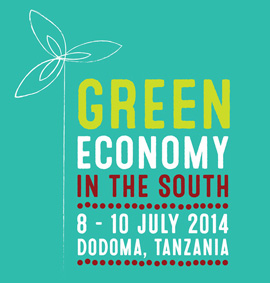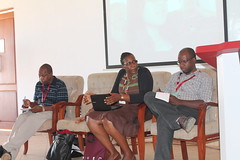Please add your comments and questions below.
Blog
Conference Field Trip: Carbon for Sale?
by Jessica Pouchet, Ph.D. Candidate, Northwestern University
What happens when a village in Tanzania has carbon to sell, but no one to buy it?
Following a stimulating conference, about a dozen participants visited a village that employs community-based forest management; located in the Manyara region of Tanzania, about a half-day’s drive from the University of Dodoma. There, we met with the village chairman as well as with members of the village natural resources committee in order to learn about their perspectives on forest conservation and the carbon trade.
Discussed at length during the conference, carbon offset schemes like REDD+ are market-based approaches to climate change mitigation. They construe forest conservation in one part of the world (generally the South) as something that can be priced, and then bought by those emitting carbon in another part of the world (the North). Aligning forest conservation with monetary value, proponents argue, will prevent deforestation. Critics, on the other hand, note that inequalities underpin the trade, which reproduces and reinforces political economic divides between the North and the South in emerging “green economies.” They further suggest that a reduction in forest degradation is not enough to offset escalating carbon emissions. And they empirically illustrate that the market is not the only, nor the best, way to value a forest.
Reflecting on ‘Green Economy in the South’, one week on
by Francis Massé, PhD Student, Department of Geography, York University
A week after the Green Economy in the South conference, many of us have had the time to reflect on what was discussed, presented, and debated. Like many who attended, I was fortunate enough to be able to take time to do some travelling in Tanzania in the company of new friends and colleagues through the connections made in Dodoma. Some very productive conversations were had. Indeed, this is an important aspect and outcome of the conference that should not be overlooked as the relationships and connections made that subsequently allow the conversations and ideas from the conference to continue and extend themselves outside of the conference venue have an unknown value in and of themselves.
Hopefully they can take hold in some meaningful way through our work whether it be research, teaching, policy or otherwise. Looking at the historical roots of the conference itself, I think it is evident that the series of conferences of which Green Economy in the South is a part of has succeeded in developing and continuing the conversation looking at the links between capitalism and nature.
Storify: tweets, images & blogs from the conference
Our conference Storify tells the story of the event through tweets, images and links to blogs and other relevant material.
Browse the Storify below and follow the links to read more on the debates at Green Economy in the South.
Experiencing the ‘Land Rush’ game
By Ruth W. John (M.A student, Geography and Environmental Management, UDSM).
The Green Economy in the South conference succeeded in bring together different scholars from different part of the world. These scholars presented and discussed academic papers ranging from mining, tourism, forestry, wildlife, environmental governance, carbon conservation, political ecology, Wildlife Management Areas, agricultural modernization, climate change, Green economy, biofuels etc.
Unlike many conferences, though, this one was not all about presentation of papers and discussions at plenary and panels. It also included other interesting and entertaining sessions relevant to the conference themes. One such event was the Land Rush game. The game is about the dynamics revolving around land use, and is very applicable to many African situations, in that it addresses issues of land grabbing associated with green economy investments. Here is a very quick ABC of how to play.
How the Green Economy in the South conference helps young researchers
by Nancy Rushohora, Stella Maris Mtwara University College and University of Pretoria
The Green Economy in the South conference is an international event which has brought a very unique experience to the South. As Daniel Brockington suggested in an earlier post,“There is something new afoot, something brewing, something growing”. The event has given room for young scholars to share their research findings and receive rich comments to enhance their studies.
The conference has also provided room for African researchers based in different parts of the world to interact, share experience and knowledge within a concomitant agenda. Indeed, this year’s conference brings a brand new outlook to the debate.
Missionary discourses: can the green economy bring climate justice to the South?
By Joanes Atela, PhD student, Leeds University
The green economy has become one of the most powerful political and social agendas in the era of climate change. Central to this green economy is the emergence of carbon market mechanisms as a form of green development for climate change mitigation and adaptation.
The carbon phenomenon has attracted a variety of multilateral and bilateral investments from the North to the South, with the premise that it represents a form of climate justice for the states and local communities who could participate in these schemes. But in academic and political debates on green economy, questions have been raised as to what extent these carbon schemes – as part of the green economy – represent realistic climate justice to climatically vulnerable farmers and pastoralists in the South.
Specific cases of carbon schemes in Ghana (Vision 2050 carbon project), Zimbabwe (Kariba REDD project) and Kenya (the Kenya Agricultural Carbon Project) indicate that these schemes, in their designs, perpetuate a generic discourse around ‘ecological and social missionary’. In this discourse, projects claim to bring a new life to the ecosystem and livelihoods in the respective target localities that are now suffering the impacts of global change.
A culture of extraction and exclusion: How philanthropy impoverishes the vulnerable
by Rebecca Pointer, Information and Communications Officer, Institute for Poverty, Land and Agrarian Studies (PLAAS)
Well-intentioned people the world over see transformation to green ways of doing as absolutely essential. Many argue that by switching to green ways of doing, we can have win-win situations in which we tackle both environmental degradation and poverty, through innovative projects and by conserving wild areas where there still exist.
Yet, in the Green Economy in the South conference, currently underway in Dodoma, Tanzania, case study after case study is showing how the language and practices of switching to ‘green’ result in the extraction of resources from Africa to the North, from the poor to the wealthy, all under the guise of philanthropy and development. Processes funded by Northern development agencies, such as REDD+, result in capital accumulating more by dispossessing Africans, enclosing African land, and selling ecological services to the wealthy few who can afford the high price tag.
Policies, resistance and states in the Green Economy in the South
by Dr Carl Death, University of Manchester, carl.death@manchester.ac.uk
‘Breadth and depth’ of research are two obvious advantages to those attending the ‘Green Economy in the South’ conference in Dodoma. The range of papers, topics, perspectives and case studies covered over three days of panels has been impressive in its breadth; whereas the opportunity to raise questions, debate them, and return to them in later panels (or over dinner) with researchers working on related topics enables a depth of engagement rarely possible at large conferences.
These two advantages are of course in addition to the political, intellectual and social rewards of attending a conference in the South, with much greater participation from Southern researchers than is also normally possible at conferences in Europe or North America.
If the breadth of topics covered is constantly stimulating, it is the possibility of reiterated in-depth discussions across and between panels that is particularly rewarding.
Three specific themes are worth highlighting in terms of questions which have been raised at almost every session in different ways and from different angles: alternative policies, local agency, and the role of the state. All three raise important issues for those concerned with developing a critical perspective on the politics of the green economy.
The problem with carbon credits: evidence from sub-Saharan Africa
by Beatrice Ouma, Communications and Networking Co-ordinator, Future Agricultures Consortium
When carbon credit projects were introduced in sub-Saharan Africa, many in the global South received them with a lot of enthusiasm and expectations. Their potential to provide income to small African farmers while contributing to the objectives of mitigating climate change was seen as a win-win scenario. These projects seek to engage small farmers by providing financial incentives to those who participate in conservation that contributes to reducing emissions and combating deforestation.
However, in reality, the benefits of carbon credits remain elusive to smallholder farmers for a number of reasons explored in the second plenary, Carbon and Livelihoods.



